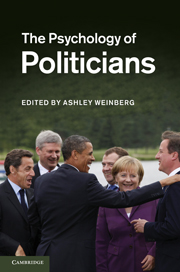Book contents
- Frontmatter
- Contents
- Figures
- Tables
- Acknowledgements
- Contributors
- 1 The psychology of politicians
- Part I Becoming politicians
- Part II Being at the centre of things
- Part III Coping with pressure?
- 7 Should the job of national politician carry a government health warning?
- 8 When cognitions reach boiling point
- Part IV People as politicians
- Index
- References
8 - When cognitions reach boiling point
The impact of denial and avoidance by policy-makers during a foreign policy crisis
Published online by Cambridge University Press: 05 December 2011
- Frontmatter
- Contents
- Figures
- Tables
- Acknowledgements
- Contributors
- 1 The psychology of politicians
- Part I Becoming politicians
- Part II Being at the centre of things
- Part III Coping with pressure?
- 7 Should the job of national politician carry a government health warning?
- 8 When cognitions reach boiling point
- Part IV People as politicians
- Index
- References
Summary
Introduction
This chapter examines when, how and why politicians in key positions employ strategies of denial and avoidance which can lead to serious shortcomings in their government’s preparedness when danger threatens. A theory of political coping is proposed and applied to a case study of a well-known foreign policy crisis. This focuses on how US President Lyndon Johnson and Defence Secretary Robert McNamara responded to the gradually increasing stream of intelligence reports and threat assessments that warned them of the ‘Tet Offensive’ during the Vietnam War and the impact of their denial and avoidance on their state of preparedness on 30 January 1968, when Viet Cong insurgents and the North Vietnamese Army (NVA) began the offensive.
This chapter puts forward four claims. Firstly, denial and avoidance form an essential part of the coping responses of politicians when faced with threat-related information and impending danger during domestic or foreign policy crises (see also Golec in chapter 5). Secondly, irrespective of the type of political system in which the politician operates, where responding to the danger may tax or exceed available resources and/or lead to political and moral dilemmas and psychological strain, the more likely s/he is to deny and avoid aspects of threat-related information (TRI). Thirdly, the degree to which some political systems permit and in some ways even encourage denial and avoidance by politicians during crises varies from one type of system to another. For example, multi-party-based coalitions and democratic governments may be less tolerant of denial and avoidance by their key policy-makers than governments characterised by authoritarian or one-party-dominated presidential systems. Fourthly, this chapter claims that denial and avoidance by individual politicians during ‘pre-encounter’ phases in advance of a crisis can have a profound impact on a government’s state of preparedness when dangers actually strike. Politicians in key executive positions in a governmental warning-response process, such as president, prime minister, minister of defence or minister of interior affairs, often have the institutionalised task and political responsibility of playing key roles in domestic and foreign policy crises. Given the significance of policy-makers in the collation and utilisation of TRI and in translating these signals into political decisions and timely counter-measures, it is plausible to expect that the way they cope with TRI can have a profound impact on governmental preparedness. In other words, the longer and more intense the politicians’ denial and avoidance, the more marked the impact on the government’s preparedness. In a global context which demands both awareness of, and responses to, impending threats to security, an insight into politicians’ ability to cope with TRI and conflicting political demands is essential.
- Type
- Chapter
- Information
- The Psychology of Politicians , pp. 143 - 168Publisher: Cambridge University PressPrint publication year: 2011



